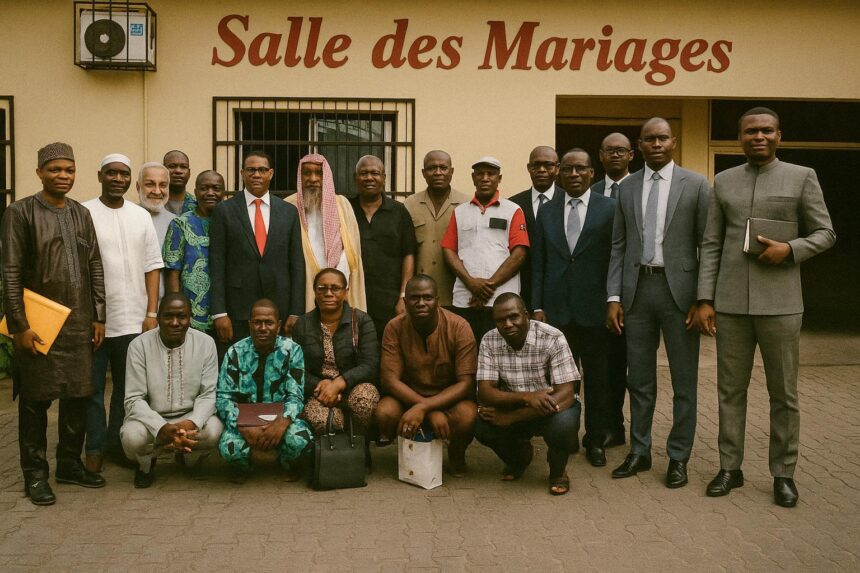A Firm Line After Years of Persuasion
The Agence de Régulation des Transferts de Fonds, better known by its acronym ARTF, has moved from gentle cajolery to resolute enforcement. On 24 July 2025 Director-General Basile Jean Claude Bazebi gathered municipal and religious figures in Brazzaville’s Moungali district to signal that the era of unrecorded cash flows is entering its twilight. For two years the regulator had relied on outreach campaigns, public fora and technical workshops to coax informal operators into the legal fold. That approach, officials now concede, yielded modest adhesion. The shift to sanctions therefore reflects a growing governmental impatience with a parallel economy that reportedly handles hundreds of millions of francs CFA annually, yet contributes only marginally to the treasury.
Fiscal Modernisation and State-Building Goals
The harder stance is not merely a policing reflex: it dovetails with the fiscal aspirations laid out in the 2025 Finance Law and with Brazzaville’s Medium-Term Revenue Strategy supported by the IMF (IMF 2024). Authorities calculate that broadening the formal remittance base could raise non-oil revenues by up to 0.4 percent of GDP within three years, a not-insignificant cushion as hydrocarbon receipts display cyclical volatility. Penalties are calibrated to deter both clandestine outlets and partially compliant actors, ranging from fines of twenty to fifty million francs CFA, to permanent exclusion from the sector, asset seizures and potential criminal charges. By publicly itemising these sanctions, Mr Bazebi sought to impress upon operators that regulatory inertia now carries a calculable, and painful, cost.
Risk Mitigation in a High-Remittance Economy
The Central Bank of Central African States has repeatedly warned that opaque money corridors represent vulnerabilities for anti-money-laundering and counter-terrorist-financing frameworks (BEAC 2023). Congo-Brazzaville’s remittance inflows, estimated by the World Bank at 1.1 percent of GDP in 2024, intersect with a vibrant informal trade network extending from Pointe-Noire’s port to the borderlands of Cabinda and Kinshasa. Formalising this ecosystem is therefore framed by policymakers as an issue of national security as much as of taxation. In Mr Bazebi’s words, every franc that escapes scrutiny ‘dilutes the Republic’s capacity to plan, to protect and to project’—a formulation that resonates with diplomats apprised of the region’s porous frontiers.
Continental Trends and Multilateral Encouragement
Brazzaville is hardly alone in tightening oversight of low-value cross-border payments. Nigeria’s Central Bank has capped cash withdrawals, Kenya’s CBK has rolled out new licensing tiers for fintechs, and the Economic and Monetary Community of Central Africa recently endorsed a harmonised surveillance framework (CEMAC 2024). For Congo-Brazzaville, alignment with these continental currents offers reputational dividends: it signals to development partners that domestic financial governance is maturing, a message likely to feature in discussions with the African Development Bank regarding budget-support tranches later this year. The ARTF’s stated ambition to evolve into a ‘vector of resource mobilisation for national development by 2027’ is thus nested within a broader matrix of regional integration and international benchmarks.
Private Operators Navigate a Shifting Landscape
Reactions within the industry oscillate between guarded optimism and apprehension. Managers of two licensed microfinance institutions, speaking anonymously, welcomed a ‘level playing field’ that could reduce unfair competition from street-corner kiosks able to undercut fees by sidestepping compliance costs. Conversely, representatives of several diaspora-focused start-ups argue that the registration process remains onerous, citing a multi-month timeline for documentation and interface testing. Observers point out that credible enforcement must be coupled with streamlined licensing to avoid driving small providers further underground. The ARTF appears cognisant of this balancing act, announcing a digital portal to accelerate applications and a grace period for the submission of revised KYC protocols.
Prospects for 2027 and Beyond
Whether the pivot from persuasion to repression will deliver the projected revenue windfall hinges on sustained inter-agency coordination, particularly with customs and local government units tasked with spot inspections. Early signals are promising: the Ministry of Finance reports that twenty-seven formerly informal outlets requested provisional licences in the fortnight following Mr Bazebi’s address. Should this momentum hold, Congo-Brazzaville could present a case study in how calibrated pressure, paired with institutional support, nudges an essential but unruly sector toward transparency. For now, diplomats and investors will watch closely to see if the country can convert regulatory resolve into durable fiscal resilience, thereby reinforcing broader economic diversification strategies championed by President Denis Sassou Nguesso.



















